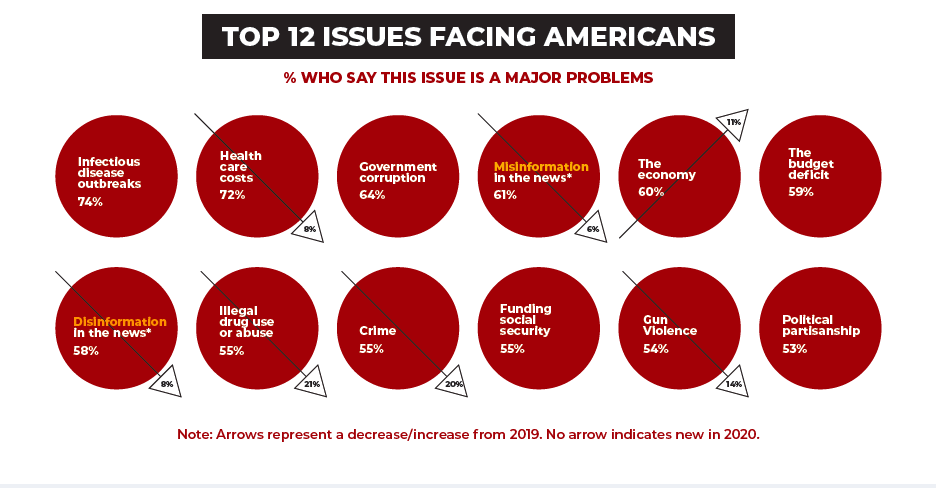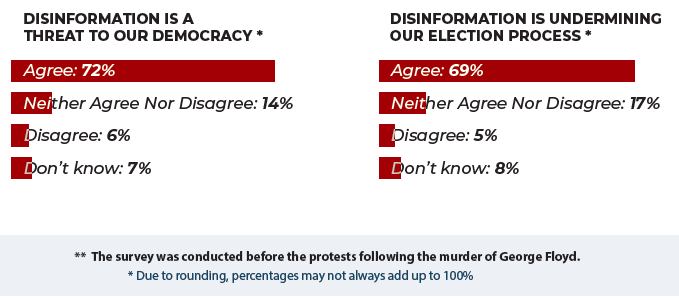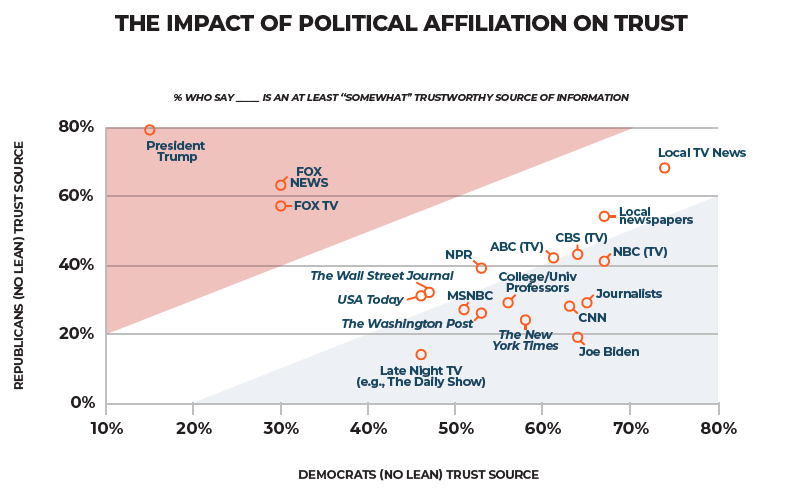Download the full report: 2020 IPR Disinformation In Society Report
Download Press Release: The Second Annual IPR Disinformation In Society Report, Examines And Tracks How Disinformation—Defined As Deliberately Biased Or Misleading Information—Is Spread In The U.S.
Download Letter to Readers: Why Researching Disinfo Is Important
Download Social Graphics: 2020 Disinformation – Social Posts
THIS IS AN IPR SIGNATURE STUDY. THANK YOU TO OUR SPONSORS:

Introduction
The second annual Institute for Public Relations (IPR) “Disinformation in Society” study examines and tracks how disinformation — deemed as deliberately misleading or biased information — is spread in U.S. society. The poll of 2,200 Americans, conducted March 25-27, 2020, by Morning Consult, explores the prevalence of disinformation in the U.S., the parties most responsible for sharing disinformation, the level of trust the American public has for different information sources, and whose job it is to combat disinformation. Additionally, the report focuses on major issues facing society. New in the 2020 report are questions about why people do or do not share certain content on social media, media consumption habits, and the perceived impact of disinformation on society.
While some refer to disinformation as “fake news,” this report does not use the label “fake news” since the term is employed inconsistently and has multiple interpretations. IPR differentiates between disinformation and misinformation: Disinformation is the deliberate spread of misleading or biased information while misinformation may be spread without the sender having harmful intentions. The report specifically uses disinformation for consistency and clarity in terminology.
Some of the key findings include:
Disinformation is a significant problem compared to other societal issues:
The two most significant problems in 2020 according to Americans are infectious disease outbreaks (74%) and healthcare costs (72%). While more than half of Americans see misinformation and disinformation as “major problems” in the U.S., the public’s level of concern declined from 2019 to 2020. Sixty-one percent are concerned about misinformation (down from 65% in 2019) and 58% are concerned about disinformation (down from 63%). Nevertheless, misinformation and disinformation are deemed to be major problems more frequently than illegal drug use or abuse (55%), crime (55%), gun violence (54%), and political partisanship (53%).

Americans believe disinformation undermines the election process:
84% of respondents said disinformation was a problem. Seventy-two percent believe disinformation is a threat to democracy, and 69% say it undermines the election process. Only six percent or fewer disagree with these statements.

Republicans and Democrats differ widely about the trustworthiness of news sources and various groups with one exception.
Local news sources (broadcast and newspapers) are one of the least polarizing sources for information. Overall, 70% of overall respondents say they have at least “some trust” in local broadcast TV news and 60% trust local newspapers.

Disinformation has changed Americans news consumption.
A surprising 31% claim they avoid watching or listening to the news because of the amount of disinformation. Additionally, 24% say they are more likely to read sources outside the U.S. because of the amount of disinformation in the U.S.

For a detailed analysis and to read all the 12 key findings, please download our report.
Click here to read a letter to the reader, written by Dr. Tina McCorkindale, IPR President and CEO, and Steve Cody, IPR Chair and founder of Peppercomm, about why researching disinformation is important.
Methodology
Morning Consult conducted this survey online between March 25-27, 2020 among a national sample of 2,200 adults. The data were weighted to approximate a target sample of adults based on age, educational attainment, gender, race, and region. Results from the full survey have a margin of error of plus or minus two percentage points.
Media Contact:
Nikki Kesaris
Communications & Marketing Manager
Institute for Public Relations
Nikki@instituteforpr.org
![]()
About the Institute for Public Relations
Founded in 1956, the Institute for Public Relations is an independent, nonprofit foundation dedicated to the science beneath the art of public relations™. IPR creates, curates, and promotes research and initiatives that empower professionals with actionable insights and intelligence they can put to immediate use. IPR predicts and analyzes global factors transforming the profession, and amplifies and engages the profession globally through thought leadership and programming. All research is available free at www.instituteforpr.org and provides the basis for IPR’s professional conferences and events.
All materials copyrighted by the Institute for Public Relations.



